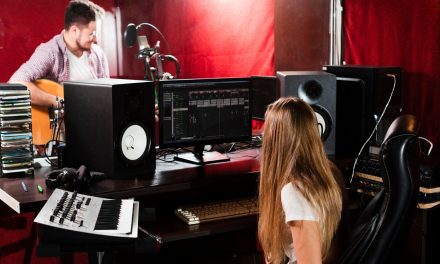Collaborating effectively in music production involves mastering key techniques. It also requires implementing strategic approaches and fostering clear communication channels. Each of these steps helps to harmonize collaborative efforts toward a common musical goal.
To ensure successful collaboration in music production, you should start by establishing a shared vision among team members. When everyone is on the same page about the project’s direction and purpose, working together toward a cohesive outcome is much easier.
Using project management tools and software can help streamline communication. This also makes tracking the project a breeze. Make sure to have regular check-ins and progress updates. This ensures everyone is aligned with project milestones. Creating a culture of openness and feedback is also crucial. It nurtures a collaborative environment where ideas can flow freely, and creative synergy can truly thrive. Read on to learn how to collaborate in music production.
Communication and Goal-setting
In successful music collaboration, effective communication and goal-setting are key. They help you and your fellow artists to do the following:
- Align your creative visions
- Share ideas effortlessly
- Carry out projects with precision and harmony
To make sure everyone’s on the same page, it’s important to have clear communication channels. By expressing your thoughts clearly, you can ensure that all collaborators understand each other. Setting specific goals and milestones lets you track progress. This also keeps the motivation up and helps you tackle challenges as a team.
Regarding online music collaboration, new ideas are changing how artists work together. Virtual music sessions allow musicians to connect from anywhere. Meanwhile, interactive interfaces offer real-time feedback and editing features. Ultimately, this makes the collaborative process even better.
Sharing and Combining Ideas
In music collaboration, you and your fellow musicians bring different ideas together. This sparks creativity and gives birth to new perspectives and fresh approaches. Such tactics transform collaborative music projects into unified musical wonders.
When you use collaborative music apps and project management tools, sharing melodies, lyrics, and production ideas becomes a breeze. These tools make the workflow smoother, ensuring that a variety of musical inspirations blend seamlessly.
Instant feedback and suggestions help elevate the overall quality of the collaborative work. The result is a beautiful fusion of individual talents. Innovative solutions in music collaboration bridge physical distances and create deeper connections among artists. This helps to nurture a dynamic space for exploring creativity and personal growth.
Delegating Tasks and Responsibilities
Delegating tasks when collaborating on music production is essential. This offers benefits like
- A fair distribution of work
- Making the best use of resources
- Keeping things running smoothly throughout the music-making process
By delegating tasks effectively among team members, everyone can focus on what they do best, resulting in higher-quality output. Assigning roles carefully allows each person to bring their unique skills and strengths to the table. This, in turn, gives the project a diverse range of perspectives and abilities.
Managing resources strategically is a must to coordinate timelines, budgets, and assets effectively and hit project milestones. Collaborative platforms and tools provide a central hub for communication, file sharing, and real-time feedback. This ensures a smooth workflow that boosts productivity and creativity all around. For more insight into collaborative music production, check out DLK Music Pro.




